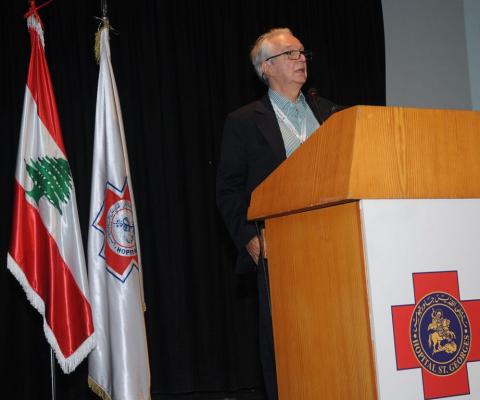
Mollica: Refugees must be prepared for their return to their homeland from the first day
E. Karam during the St. Georges Hospital University
Medical Center’s annual congress: the effects of
domestic violence are stronger on individuals than the
effects of war
As part of the St. Georges Hospital University Medical Center –Achrafieh’s annual congress, the Department of Psychiatry and Clinical Psychology at the hospital organized a Community Mental Health Symposium where speakers presented a number of projects that have been implemented or are currently being implemented within specific communities such as Syrian refugees and school children. During the symposium, Dr. Elie Karam, psychiatrist and mental health researcher at the Department of Psychiatry and Clinical Psychology at the St. Georges Hospital University Medical Center and the Faculty of Medicine at the University of Balamand and President of the Institute for Development Research Advocacy and Applied Care (IDRAAC) revealed that a study conducted by IDRAAC on a number of Lebanese schools which hosted Syrian and Lebanese students showed that "the effects of domestic violence are stronger on individuals than the effects of war".

Mollica
Professor Richard Mollica, Director of the Harvard Program in Refugee Trauma (HPRT) of Massachusetts General Hospital and Harvard Medical School and one of the leading international researchers in the field of mental health care of survivors of violence and trauma discussed the issue of the return of refugees to their home country.
Professor Mollica presented the “Ghata” project for the Syrian refugees in Lebanon which he implemented with the Center for Civic Engagement and Community Service (CCECS) at the American University of Beirut in collaboration with the Harvard Program in Refugee Trauma.
He noted that we need to have “a different way of thinking about refugees: we have to move away from the approach of food, water and shelter, to an approach that has to do with people being restored to wellness after being damaged by terrible violence and atrocities. So our approach needs to be a restoration approach, not only the basic needs” he said.
He proposed a new “model in which we activate people from the time they distress to self-actualize themselves to go home, to have a job, to have a skill… since day one and not after years of displacement”.
He also shared the result of “his studies on a sample of displaced children in Lebanon which "revealed that children were highly traumatized, having witnessed and experienced terrible violence and atrocities. Rates of PTSD and depression were over 50% and bullying and domestic violence were high”.
Shibli
The Director of the Center for Civic Engagement and Community Service at the American University of Beirut Rabih Shibli also addressed the Ghata program and the impact of the "restorative environment" on the mental health of refugees in Lebanon. Shibli pointed out that “over half of the Syrian refugees living in Lebanon are under the age of 18, with more than 60% out of school. Although the crisis entered its seventh year, relief agencies are still predominantly using tents for the provision of shelter and education. “The average life span of a tent is 6 months, and the fabric and support elements are not adequate for the vicissitudes of the turbulent weather in semi-arid regions of the Middle East. “
He explained that the Ghata intervention has developed “10 portable school campuses located within refugees’ Informal Tented Settlements and serving around 5000 students annually”.
In addition, the Center for Civic Engagement and Community Service partnered with the Harvard Program in Refugee Trauma (HPRT) for a “study in Lebanon on Syrian refugees to assess the frequency and impact of mental health problems and trauma outcomes (PTSD, Depression, Anxiety) on children aged 12-14 attending Ghata schools versus tented schools”.
Cordahi-Tabet
Caroline Cordahi-Tabet, child and adolescent psychologist at the Department of Psychiatry and Clinical Psychology at the St. Georges Hospital University Medical Center and the Faculty of Medicine at the University of Balamand and IDRAAC, gave a presentation titled “Resilience-Building Interventions within the School System” which addressed “evidence-based psychological intervention programs, aiming at promoting resilience in youth and emphasizing on the significant components and challenges to be considered when working with children and adolescents at risk.” She also elaborated on “models of intervention, aiming at enhancing children and adolescent resilience and improving their mental health in the face of adversity”. These programs were implemented in several schools with mental health professionals who helped a large number of children affected by war and displacement in learning behavioral skills which would help them overcome psychological difficulties. She also shared a series of challenges and recommendations to be considered when working in community mental health programs.

Elie Karam
Dr. Elie Karam, psychiatrist and mental health researcher at the Department of Psychiatry and Clinical Psychology at the St. Georges Hospital University Medical Center and the Faculty of Medicine at the University of Balamand and President of IDRAAC, discussed “Improving Mental Health and Personal Competence” and explained a “therapeutic intervention, aiming at improving the children and adolescents mental wellbeing delivered by teachers in the classroom”.
The intervention was provided to both Lebanese and Syrian refugees in their classrooms. The study also highlighted the role of personal competence as an important mediator in predicting the improvement in mental health outcomes (such as depression and anxiety). The study was also based on an important indicator which is the sensitivity of children (ie, to what extent the child is sensitive to his/her surrounding). The main findings of the study was that "the domestic violence that refugee children may face negatively affects their mental health and its impact is stronger than that of war on the child.” This is why he stressed the importance of "working to provide a healthy home environment for the improvement of children's mental health".
Categories
- Log in to post comments